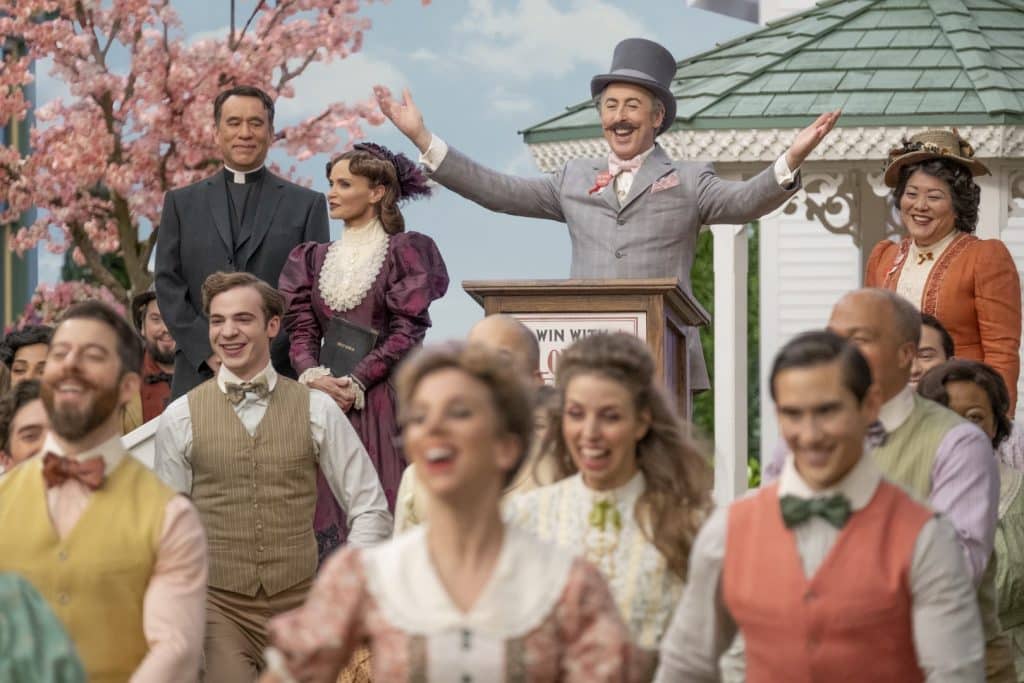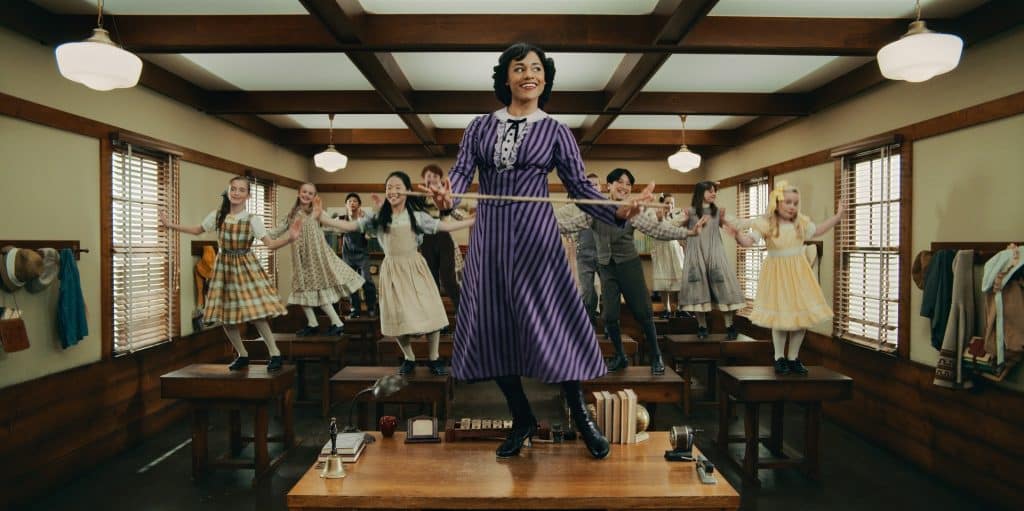Read also:
How to Watch FX Live Without CableHow To Watch AMC Without CableHow to Watch ABC Without CableHow to Watch Paramount Network Without CableCecily Strong and Keegan-Michael Key lose themselves in a sunny song-and-dance in Apple TV+’s short, but inviting, musical comedy.
Even I have to admit that being trapped in a classic musical sounds like a waking nightmare. That’s exactly what happens to Melissa (series producer Cecily Strong) and Josh (Keegan-Michael Key) when they find themselves in the isolated titular town of Schmigadoon. After getting lost on a couples retreat, the pair pass a magical barrier only to find they are unable to leave until they find True Love. They’ll have to sing and dance their way into love, or risk being stranded in Schmigadoon forever.
What supports this otherwise commonplace plot is the strength of its cast. Strong and Key have remarkable chemistry between themselves and the townsfolk. They’re a believable couple, able to convey the annoyances of long-term relationships as well as the deep knowingness that grows from sharing a life with someone.
Just as their relationship with each other changes, it’s also fun to see Melissa and Josh’s relationship to Schmigadoon ebb and flow throughout the six-episode run of the series, which was made available for review in its entirety. They are the leads, yes, but like any good ensemble musical, they’re more than willing to sit back and support the other cast members, often standing in for the audience to lend an ironic perspective to the nauseatingly cheerful world we’ve found ourselves in.

This is easy for them to do with a supporting cast as pitch-perfect as this one, each performer a Broadway icon in their own right. Aaron Tveit (Next to Normal) expertly plays the town bad boy who won’t be tamed by no gal no how. Ann Harada (Avenue Q) is the mayor’s naive and neglected wife which she plays with fierce intelligence and heart. Ariana DeBose (Hamilton) will steal your heart as the headstrong school teacher with a past. And though not yet a Broadway star, Dove Cameron (Disney’s The Descendents) as the questionably-aged waitress who charms her way between Melissa and Josh reveals a budding theatrical talent that’s ready for more adult roles.
She no doubt has had some coaching from former film-mother, Descendants costar, and Broadway legend Kristin Chenoweth (You’re a Good Man Charlie Brown, Wicked) who dazzles as wife to the pastor (Fred Armisen) and town morality police with a secret of her own. Chenoweth proves yet again that she’s as deliciously ham in front of the television camera as she is with a live audience.
Alan Cumming (Cabaret) brings his usual brilliant winking performativity to Schmigadoon as the town mayor. His is the most obvious character trajectory in the series, but Cumming adds dynamic layers of humor and humanity to craft a genuinely compassionate performance. Without this sensitivity, Mayor Menlove would just have been a hollow pawn in the creative objectives of the series.
There’s a reverence for the musicals from the 1940s, ’50s, and ’60s, but it’s through a sharpened critical and contemporary lens.
The artistic team of Cinco Paul and Ken Daurio (Cats Don’t Dance, Bubble Boy, Despicable Me series) have conceived of a series that upends classic musical tropes and motifs while still paying homage to the films that inspired them. A series is a great way to fully explore and expose the genre because you have the time to touch on all the major cliches. Teaming up with writers and consultants like Julie Klausner (Difficult People) and Bowen Yang (Nora from Queens, SNL) ensures that a wry sense of pop-culturally-aware irony pervades Schmigadoon. There’s a reverence for the musicals from the 1940s, ’50s, and ’60s, but it’s through a sharpened critical and contemporary lens, brilliantly showcased by Paul’s music.
All of the stock numbers you expect in a classical musical sound so uncannily close to famous show tunes. The typical opening “meet the town” song rubs so near the opening tune of Oklahoma that you’d swear they were just doing a direct parody. But just like the name Schmigadoon is not quite Brigadoon, the musical numbers are their own wholly original creations.
Series director Barry Sonnenfeld and choreographer Christopher Gattelli capitalize on this seamlessly to give us little visual allusions to classic musicals like Singin in the Rain, Carousel, West Side Story, and many others. In many ways, the series repeats visual, narrative, and musical tropes from The Golden Age of Musicals while trying to critique them with varying degrees of success.

The most readily apparent goal is to satirize and deconstruct the norms regulating gender and sexuality within the classic Hollywood musical. As a modern independent woman trapped in these old musicals, Melissa has to deal with the near-constant chauvinism from the men and women in the town. But through wit and determination, Melissa eventually overcomes these genre barriers. Because “women were so underwritten in the 1940s” as Melissa sighs at one point, there’s more room for her to write her own story.
But, frankly, critiques of gender and sexuality in the classical Hollywood musical are a dime a dozen. Most films that look back on them readily point out how conservative, limiting, and harmful gender roles and stereotypes are in these films. Schmigadoon is much the same. It’ll vocally point out that men and women are conscripted into rigid gender roles and that queer people are stifled, but there’s very little new criticism being done.
This is most starkly evident on the subject of race. With a handful of jokes about “color-blind casting” and “miscegenation,” Schmigadoon is all over the place when it comes to the role and position of race within the town, Hollywood musicals, and the series itself. It at once tries to make race “not a big deal” by having a diverse chorus and interracial marriages, while also using concerns about racial mixing as a signal for the backwardness of the mayor’s wife and her followers. In doing so, it leaves race by the wayside entirely with little but a few mixed signals.
By the end, the well-placed criticisms and innovations are somewhat dulled by the compulsive conformity so glaringly present in the finale.
That’s a disservice to the overall goals of the series because the musicals it’s inspired by have a lot of problems around race. One of the central ingredients of these classical musicals, the thing that is most implicitly celebrated is whiteness. Here was an opportunity to make a politically vibrant dive into the ideologies ingrained within audiences of yore and the films they were watching, but Daurio and Paul play it safe and fail to press the issue further.
Instead, the series tumbles over basic gender and genre criticism, starting pointed and ironic, before losing some of its edge and circling back into over-sweet earnestness. By the end, the well-placed criticisms and innovations are somewhat dulled by the compulsive conformity so glaringly present in the finale.
Despite its incomplete follow-through, Daurio and Paul have demonstrated that it’s still worthwhile and possible to still go back and critically reappraise the classical Hollywood musical. In fact, as we’ve seen with recent specials like Dolly Parton or Mariah Carey’s Christmas Specials, this new COVID era might be the time to embrace the filming styles of yesterday with their smaller crews and decidedly indoor aesthetics since they’re easier to monitor and control.
Schmigadoon embraces this schticky soundstage quality to deepen its criticism of the Hollywood musical. Paul and Daurio play out their plot against a setting that feels directly lifted from the source material it’s critiquing. Though the optics of the series are incomplete, Schmigadoon is a genuine and heartfelt attempt to reconcile with the past and cross the bridge to the future together.
Schmigadoon bursts into song on Apple TV+ starting July 16th.